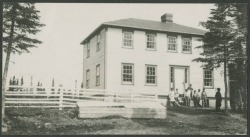Memorial Presents: Impact of Aboriginal Residential Schools in Newfoundland and Labrador

WATCH THE LIVE WEBCAST HERE - Monday, March 21, 7:30 PM NST
Canadians, in general, are only now beginning to recognize the harsh realities and negative impact of Aboriginal Residential Schools. An “educational system” that was established under assimilationist policies, its history is fraught with stories of abuse and neglect. The legacy from the residential schools is reflected in the significant educational, social and health disparities between Aboriginal people and other Canadians.
The recent report of the Truth and Reconciliation Commission of Canada has shone a spotlight on the history and legacy of the residential schools. In addition to telling Canadians about the 150-year history of the schools and its ongoing legacy, its mandate was also to guide and inspire a process of reconciliation and renewed relationships based on mutual understanding and respect. The Commissioners highlighted the role of education in reconciliation, and stressed the need to educate Canadians on residential schools and their impacts.
In 2008, the Canadian Government apologized for the residential schools and the damage they caused to Aboriginal people. However, the Indian Residential Schools Settlement Agreement excluded the residential schools in Newfoundland and Labrador. A class action lawsuit was filed by former students of those schools, and the case is pending.
This public forum will explore the history of residential schools and the experience of Aboriginal people who attended them in Newfoundland and Labrador. How many schools were there and where were they located? How many students attended? What was the impact of their stay in these institutions? Why were they excluded from the Settlement Agreement? What can we, as a society, learn from this experience? And what can we do today to correct any abuses that may have occurred and to create a more just society?
The public forum will be led by:
- Chief Wilton Littlechild, Commissioner of the Truth and Reconciliation Commission of Canada
- Catharyn Andersen, Special Advisor to the President on Aboriginal Affairs, Memorial University
- Ches Crosbie, personal injury lawyer with Ches Crosbie Barristers
- Toby Obed, Residential School Survivor
March 21, 2016, 7:30 pm – 9:30 pm at the Innovation Hall (IIC-2001), Bruneau Centre for Innovation, St. John's Campus
Free admission and free parking in Lot 15b. Attend in person or via the webcast.
To watch the webcast simply visit www.mun.ca/harriscentre at the time of the event, a "watch live" link will be posted.
The forum is presented as part of Aboriginal Peoples Week: Truth and Reconciliation
March 21 – 24, 2016 - a series of events presented by Faculty members, researchers, students, staff and guests, organized by Memorial University’s Office of Aboriginal Affairs in partnership with the Aboriginal Resource Office. The week is intended to inform the community, spark dialogue and discussion and respond to the release of the Truth and Reconciliation Report. Visit www.mun.ca/reconciliation for more details.